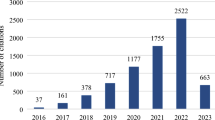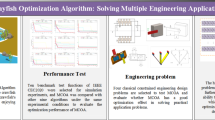Abstract
Despite the lack of theoretical and practical convergence support, the Nelder–Mead (NM) algorithm is widely used to solve unconstrained optimization problems. It is a derivative-free algorithm, that attempts iteratively to replace the worst point of a simplex by a better one. The present paper proposes a way to extend the NM algorithm to inequality constrained optimization. This is done through a search step of the mesh adaptive direct search (Mads) algorithm, inspired by the NM algorithm. The proposed algorithm does not suffer from the NM lack of convergence, but instead inherits from the totality of the Mads convergence analysis. Numerical experiments show an important improvement in the quality of the solutions produced using this search step.









Similar content being viewed by others
References
Audet, C., Béchard, V., Le Digabel, S.: Nonsmooth optimization through mesh adaptive direct search and variable neighborhood search. J. Global Optim. 41(2), 299–318 (2008)
Audet, C., Dennis Jr., J.E.: Mesh adaptive direct search algorithms for constrained optimization. SIAM J. Optim. 17(1), 188–217 (2006)
Audet, C., Dennis Jr., J.E.: A progressive barrier for derivative-free nonlinear programming. SIAM J. Optim. 20(1), 445–472 (2009)
Audet, C., Dennis Jr., J.E., Le Digabel, S.: Parallel space decomposition of the mesh adaptive direct search algorithm. SIAM J. Optim. 19(3), 1150–1170 (2008)
Audet, C., Hare, W.: Derivative-Free and Blackbox Optimization. Springer Series in Operations Research and Financial Engineering. Springer, Berlin (2017)
Audet, C., Ianni, A., Le Digabel, S., Tribes, C.: Reducing the number of function evaluations in mesh adaptive direct search algorithms. SIAM J. Optim. 24(2), 621–642 (2014)
Audet, C., Kokkolaras, M., Le Digabel, S., Talgorn, B.: Order-based error for managing ensembles of surrogates in derivative-free optimization. J. Global Optim. 70(3), 645–675 (2018)
Audet, C., Le Digabel, S., Tribes, C.: Dynamic scaling in the mesh adaptive direct search algorithm for blackbox optimization. Optim. Eng. 17(2), 333–358 (2016)
Brea, E.: An extension of Nelder–Mead method to nonlinear mixed-integer optimization problems. Rev. Int. Métod. Numér. Cálc Diseño Ing. 29(3), 163–174 (2013)
Bűrmen, Á., Puhan, J., Tuma, T.: Grid restrained Nelder–Mead algorithm. Comput. Optim. Appl. 34(3), 359–375 (2006)
Chang, K.H.: Stochastic Nelder–Mead simplex method—a new globally convergent direct search method for simulation optimization. Eur. J. Oper. Res. 220(3), 684–694 (2012)
Chen, X., Wang, N.: Optimization of short-time gasoline blending scheduling problem with a DNA based hybrid genetic algorithm. Chem. Eng. Process. 49(10), 1076–1083 (2010)
Clarke, F.H.: Optimization and Nonsmooth Analysis. Wiley, New York (1983). (reissued in 1990 by SIAM Publications, Philadelphia, as Vol. 5 in the series Classics in Applied Mathematics)
Conn, A.R., Le Digabel, S.: Use of quadratic models with mesh-adaptive direct search for constrained black box optimization. Optim. Methods Softw. 28(1), 139–158 (2013)
Coope, I.D., Price, C.J.: Frame-based methods for unconstrained optimization. J. Optim. Theory Appl. 107(2), 261–274 (2000)
Craig, J.: Bluebird developer manual. http://www.civil.uwaterloo.ca/jrcraig/pdf/bluebird_developers_manual.pdf (2002). Accessed 11 June 2018
Dennis Jr., J.E., Woods, D.J.: Optimization on microcomputers: The Nelder–Mead simplex algorithm. In: Wouk, A. (ed.) New Computing Environments: Microcomputers in Large-Scale Computing, pp. 116–122. Society for Industrial and Applied Mathematics, Philadelphia, PA (1987)
Fletcher, R., Leyffer, S.: Nonlinear programming without a penalty function. Math. Program. Ser. A 91, 239–269 (2002)
Fletcher, R., Leyffer, S., Toint, PhL: On the global convergence of a filter-SQP algorithm. SIAM J. Optim. 13(1), 44–59 (2002)
Gao, F., Han, L.: Implementing the Nelder–Mead simplex algorithm with adaptive parameters. Comput. Optim. Appl. 51(1), 259–277 (2012)
Gould, N.I.M., Orban, D., Toint, PhL: CUTEr (and SifDec): a constrained and unconstrained testing environment, revisited. ACM Trans. Math. Softw. 29(4), 373–394 (2003)
Hedar, A.-R.: Global optimization test problems. http://www-optima.amp.i.kyoto-u.ac.jp/member/student/hedar/Hedar_files/TestGO.htm (2017). Accessed 11 June 2018
Hock, W., Schittkowski, K.: Test Examples for Nonlinear Programming Codes, Lecture Notes in Economics and Mathematical Systems, vol. 187. Springer, Berlin (1981)
Jahn, J.: Introduction to the Theory of Nonlinear Optimization. Springer, Berlin (1994)
Jamil, M., Yang, X.-S.: A literature survey of benchmark functions for global optimisation problems. Int. J. Math. Modell. Numer. Optim. 4(2), 150–194 (2013)
Kelley, C.T.: Detection and remediation of stagnation in the Nelder–Mead algorithm using a sufficient decrease condition. SIAM J. Optim. 10(1), 43–55 (1999)
Kitayama, S., Arakawa, M., Yamazaki, K.: Sequential approximate optimization using radial basis function network for engineering optimization. Optim. Eng. 12(4), 535–557 (2011)
Lagarias, J.C., Reeds, J.A., Wright, M.H., Wright, P.E.: Convergence properties of the Nelder–Mead simplex method in low dimensions. SIAM J. Optim. 9, 112–147 (1998)
Le Digabel, S.: Algorithm 909: NOMAD: nonlinear optimization with the MADS algorithm. ACM Trans. Math. Softw. 37(4), 44:1–44:15 (2011)
Lukšan, L., Vlček, J.: Test problems for nonsmooth unconstrained and linearly constrained optimization. Technical Report V-798, ICS AS CR (2000)
Matott, L.S., Leung, K., Sim, J.: Application of MATLAB and Python optimizers to two case studies involving groundwater flow and contaminant transport modeling. Comput. Geosci. 37(11), 1894–1899 (2011)
McKinnon, K.I.M.: Convergence of the Nelder–Mead simplex method to a nonstationary point. SIAM J. Optim. 9(1), 148–158 (1998)
Mezura-Montes, E., Coello, C.A.: Useful infeasible solutions in engineering optimization with evolutionary algorithms. In: Proceedings of the 4th Mexican International Conference on Advances in Artificial Intelligence, MICAI’05, pp. 652–662, Springer, Berlin (2005)
Mladenović, N., Petrović, J., Kovačević-Vujčić, V., Čangalović, M.: Solving spread spectrum radar polyphase code design problem by tabu search and variable neighbourhood search. Eur. J. Oper. Res. 151(2), 389–399 (2003)
Moré, J.J., Garbow, B.S., Hillstrom, Kenneth E.: Testing unconstrained optimization software. ACM Trans. Math. Softw. 7(1), 17–41 (1981)
Moré, J.J., Wild, S.M.: Benchmarking derivative-free optimization algorithms. SIAM J. Optim. 20(1), 172–191 (2009)
Nazareth, L., Tseng, P.: Gilding the lily: a variant of the Nelder–Mead algorithm based on golden-section search. Comput. Optim. Appl. 22, 133–144 (2002)
Nelder, J.A., Mead, R.: A simplex method for function minimization. Comput. J. 7(4), 308–313 (1965)
Pigache, F., Messine, F., Nogarede, B.: Optimal design of piezoelectric transformers: a rational approach based on an analytical model and a deterministic global optimization. IEEE Trans. Ultrason. Ferroelectr. Freq. Control 54(7), 1293–1302 (2007)
Price, C.J., Coope, I.D., Byatt, D.: A convergent variant of the Nelder–Mead algorithm. J. Optim. Theory Appl. 113(1), 5–19 (2002)
Rodríguez, J.F., Renaud, J.E., Watson, L.T.: Trust region augmented Lagrangian methods for sequential response surface approximation and optimization. J. Mech. Des. 120(1), 58–66 (1998). 03
Strasser, M.: Übertrangung des Optimierungsverfahrens von Nelder und Mead auf restringierte Probleme. Diploma thesis, Numerical Mathematics Group, Technical University of Darmstadt, Germany (1994)
Tao, J., Wang, N.: DNA double helix based hybrid GA for the gasoline blending recipe optimization problem. Chem. Eng. Technol. 31(3), 440–451 (2008)
Tribes, C., Dubé, J.-F., Trépanier, J.-Y.: Decomposition of multidisciplinary optimization problems: formulations and application to a simplified wing design. Eng. Optim. 37(8), 775–796 (2005)
Tseng, P.: Fortified-descent simplicial search method: a general approach. SIAM J. Optim. 10(1), 269–288 (1999)
Wang, K., Wang, N.: A novel RNA genetic algorithm for parameter estimation of dynamic systems. Chem. Eng. Res. Des. 88(11), 1485–1493 (2010)
Zhao, J., Wang, N.: A bio-inspired algorithm based on membrane computing and its application to gasoline blending scheduling. Comput. Chem. Eng. 35(2), 272–283 (2011)
Acknowledgements
This work is supported by NSERC CRD Grant (#RDCPJ 490744 - 15) in collaboration with Hydro-Québec and Rio Tinto. The authors wish to thank Shawn Mattot, Genetha Gray, and Stefan Wild for making the LOCKWOOD problem available.
Author information
Authors and Affiliations
Corresponding author
Rights and permissions
About this article
Cite this article
Audet, C., Tribes, C. Mesh-based Nelder–Mead algorithm for inequality constrained optimization. Comput Optim Appl 71, 331–352 (2018). https://doi.org/10.1007/s10589-018-0016-0
Received:
Published:
Issue Date:
DOI: https://doi.org/10.1007/s10589-018-0016-0




